
Robot
17:48, 25-Jan-2018
Japan develops robots for pet lovers who can't have pets.
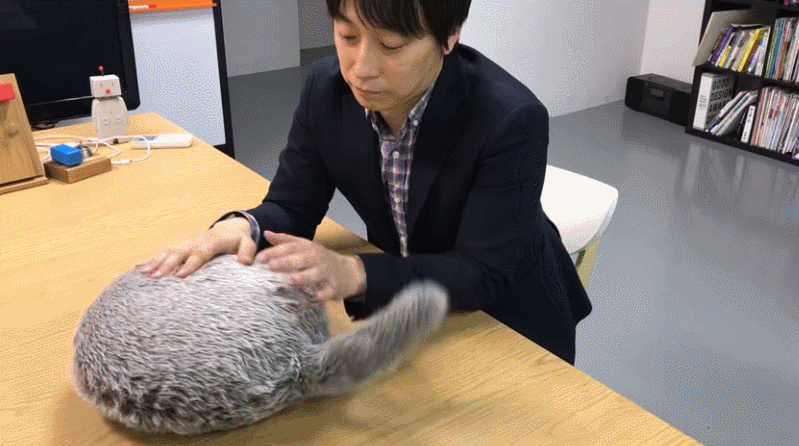
Japan, home of the “kawaii” cult of cute, has always had a soft spot for companion robots, in contrast to the more industrial or mechanical types used for assembly lines, surgeries and military missions.
Japanese companies have developed three relatively affordable home robots for the elderly, kids and hard-working salary men pressed for time. Unlike real children or pets, they have off switches and don’t need constant attention, dog food or cat litter.
QOOBO (pronounced koo-boh)
A fuzzy, huggable cushion with a whimsically swishing tail, Qoobo is designed to deliver a calming therapeutic effect for the cat-lover who can’t have a real kitty.
This companion robot is ingenuous in its simplicity - much is purposely left to the imagination: It has no face or whiskers, no legs and no purr, just a responsive tail that wags slowly when it is gently stroked and energetically when it is tapped - so it could be a dog too.
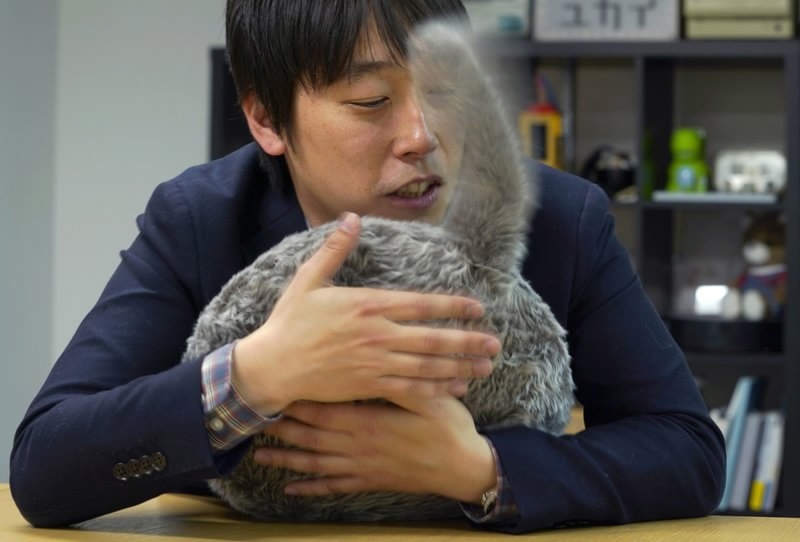
Yukai Engineering’s Tsubasa Tominaga demonstrates Qoobo, a cushion robot, at his office in Tokyo, Japan, on Jan. 10, 2018. /AP Photo
Yukai Engineering’s Tsubasa Tominaga demonstrates Qoobo, a cushion robot, at his office in Tokyo, Japan, on Jan. 10, 2018. /AP Photo
“Some say this reflects the Japanese cultural ability to appreciate negative space in art,” says Tsubasa Tominaga of Tokyo-based Yukai Engineering, which designed Qoobo.
He said the Japanese prefer to interact with cute things, not digital assistants on impersonal gadgets, as Apple does with Siri and Amazon with Alexa.
The robot cat is expected to be sold for about 10,000 yen (90 US dollars) with a definite price being set later.
AIBO
Sony’s Aibo robot dog is back with all its disarming and unpredictable charm.
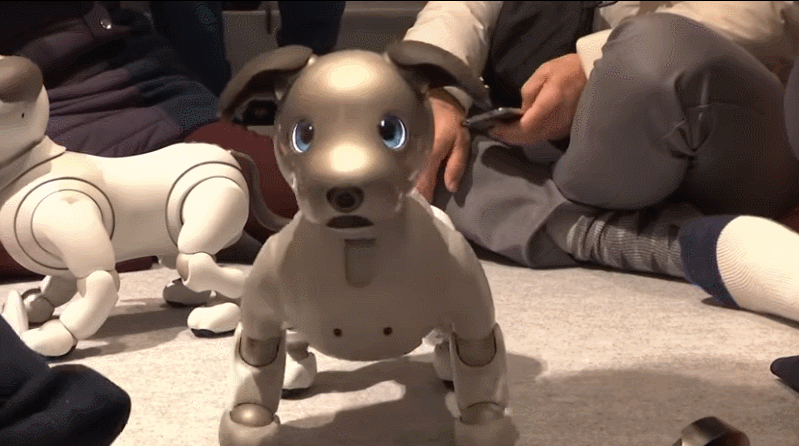
Sony’s Aibo robot dog /AP GIF
Sony’s Aibo robot dog /AP GIF
The Japanese company, best known for the PlayStation video game consoles, pulled the plug on Aibo 12 years ago, drawing an outcry from global fans.
The improved Aibo has more natural looking eyes, thanks to advanced OLED, or organic light-emitting diodes. It can cock its head and sway its hips at more varied, subtle angles. Sony says its “heart,” more aptly its brain, is in an internet “cloud” service that serves as Aibo’s memory. In theory, it could, with time and work, develop its canine artificial intelligence.
Aibo has a high-pitched electronic “bark,” but can’t otherwise talk. Like the original model, it responds to a pink ball and a pink plastic bone, to voices and to petting. It can crouch on its belly, strut around and wag its tail, do tricks like picking up the plastic bone with its mouth or lifting its paws. It seems to pant with joy when petted, and can perk an ear like it’s listening.
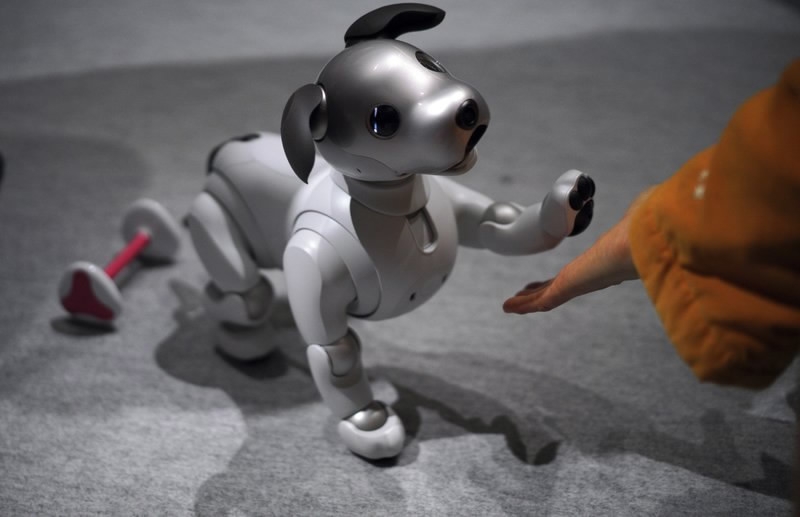
A guest plays with Sony’s new Aibo robot dog at its showroom in Tokyo, Japan, on Jan. 11, 2018, /AP Photo
A guest plays with Sony’s new Aibo robot dog at its showroom in Tokyo, Japan, on Jan. 11, 2018, /AP Photo
Sony’s Yusuke Kozuka says that given recent advances in robotics and AI, the time seemed right for a new Aibo.
Aibo went on sale Jan. 11 in Japan. The first batch of advance orders, which went on sale in November, sold out in 30 minutes. Overseas sales are being considered but the company is still undecided.
It's sold for 198,000 yen (1,800 US dollars) but has extra costs for cloud and maintenance services.
KIROBO MINI
Toyota's Kirobo Mini is small enough to fit in your hand and looks like a child clad in a space outfit. It tends to repeat phrases like, “I missed that; can you say that again?” and “Hmmmmm .....”
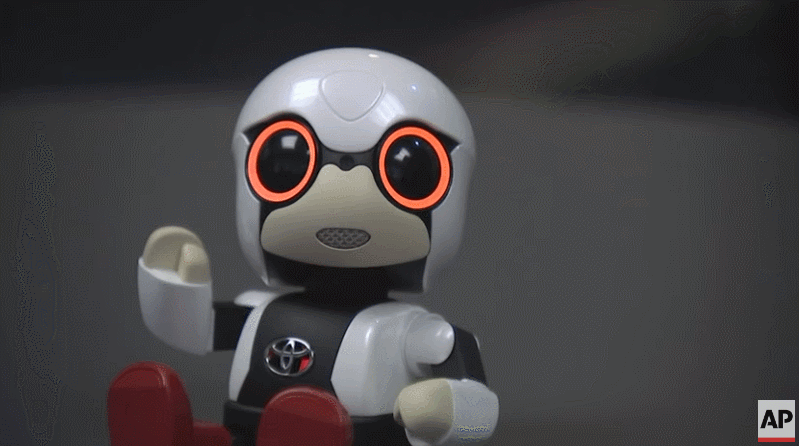
Toyota's Kirobo Mini robot /AP GIF
Toyota's Kirobo Mini robot /AP GIF
Its name combines the word for “hope” - “kibo” - with “robot.” And it’s designed for cuteness, wiggling seated on its behind, jiggling its arms. It turns its head toward a speaking voice, its saucer-like eyes glowing, sometimes asking inane questions like: “People? What are people?”
The robot understands only Japanese so far, but can be programmed to recognize your name and the name you give it. Such functions are managed through a smartphone app that updates its software periodically so Kirobo Mini will get “smarter” - growing up, so to speak.
It's sold for 39,800 yen (350 US dollars).
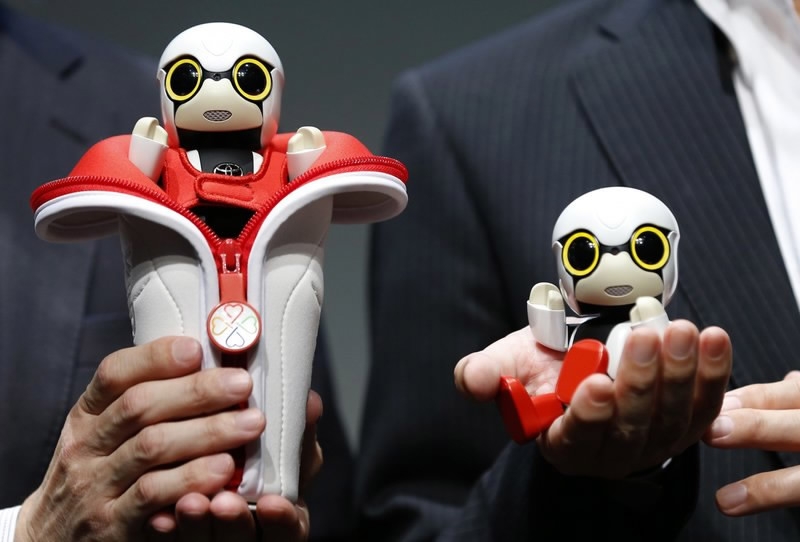
File: Compact-sized humanoid communication robots, Kirobo Mini, are displayed during a press unveiling in Tokyo, Japan, on Sept. 27, 2016. /AP Photo
File: Compact-sized humanoid communication robots, Kirobo Mini, are displayed during a press unveiling in Tokyo, Japan, on Sept. 27, 2016. /AP Photo
2105km
Source(s): AP

SITEMAP
Copyright © 2018 CGTN. Beijing ICP prepared NO.16065310-3
Copyright © 2018 CGTN. Beijing ICP prepared NO.16065310-3